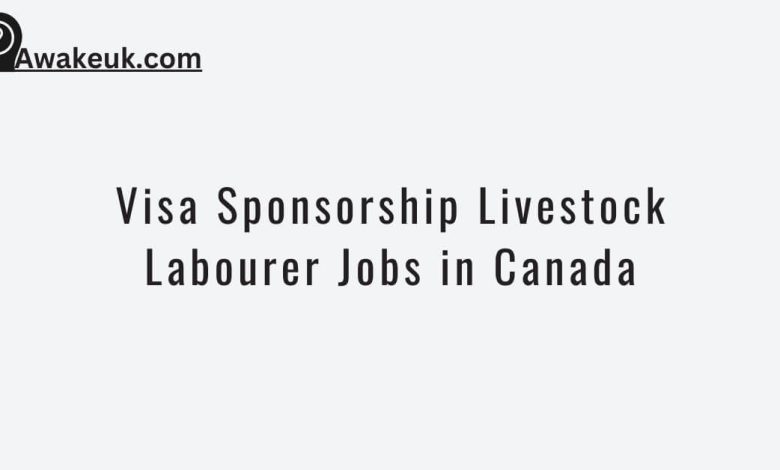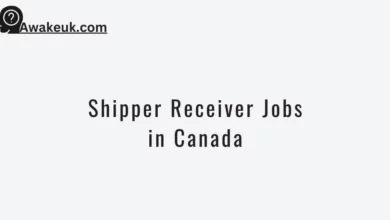Visa Sponsorship Livestock Labourer Jobs in Canada 2024

Kelly and Elise Walker, reputed Canadian livestock owners, are looking for motivated and driven individuals to fill the position of Livestock Labourer. This critical position is heavily involved in the everyday care, management, and handling of cattle. Kelly and Elise Walker are happy to grant visa sponsorship for adequately qualified international candidates, recognizing the significance of global experience.
Details About Visa Sponsorship Livestock Labourer Jobs in Canada:
- Jobs Role: Livestock Labourer Jobs in Canada with Visa Sponsorship
- Employer Name: Kelly & Elise Walker
- Location: Milk River, AB
- Jobs Type: Full Time
- Salary: CAD 20 – CAD 40 Per Hour
- Country: Canada
- Languages: English
Check Also: Hotel Maintenance Technician Jobs In Canada For Foreigners
Qualification & Experience:
- There are no strict educational requirements, however previous expertise in cattle handling or related areas is helpful. A basic understanding of English is required to ensure effective communication and instruction adherence.
Responsibilities of Visa Sponsorship Livestock Labourer Jobs in Canada:
- Help with feeding, grooming, and caring for the livestock.
- Inspect livestock for signs of illness or injury and report any concerns.
- Cleanliness should be maintained in barns, pens, and other animal places.
- If required, assist animals throughout the birthing process.
- Use and maintain livestock-related tools, equipment, and machinery.
- Maintain the livestock’s safety and well-being at all times.
- When necessary, handle cattle movement and transportation chores.
Requirements for Visa Sponsorship Livestock Labourer Jobs in Canada:
- Physical toughness, as well as the ability to do duties in a variety of weather circumstances.
- Capability to manage physically demanding duties such as lifting feed bags and restraining animals, among others.
- Work-hour flexibility, including potential weekend obligations.
- Basic operational understanding of livestock equipment or a desire to get such expertise.
- Unwavering commitment to animal care and safety standards.
Work Setting:
- Barn and open-field environments predominate, with close interaction with animals.
- A hands-on position that necessitates continual mobility, attentiveness, and an eye for detail.
Additional Information:
- On-the-job training will be provided for specific responsibilities, ensuring that all employees are familiar with the equipment and tasks.
- Based on corporate policy and current conditions, accommodation provisions may be considered.
Benefits of Visa Sponsorship Livestock Labourer Jobs in Canada:
- Employment Opportunities: Visa sponsorship allows individuals to work in Canada’s livestock business. This gives you the chance to obtain significant job experience and enhance your abilities in the agriculture sector.
- Stable Income: Livestock laborer positions provide a consistent source of income that can help workers and their families meet their financial obligations.
- Skill Development: Working in the livestock sector offers people to gain experience in animal care, handling, feeding, health monitoring, and farm management. This experience can help them improve their professional skills and advance their careers.
- Cultural Exchange: Working in Canada via visa sponsorship allows for cultural exchange as well as exposure to a new culture and way of life. Workers can enrich their personal experiences by learning about Canadian customs, traditions, and language.
- Legal Employment Status: Visa sponsorship provides persons with legal employment status in Canada, granting them rights and protections under Canadian labor laws.
- Healthcare Benefits: Depending on the exact program and duration of their work contract, workers under visa sponsorship may have access to Canadian healthcare services during their stay.
- Safety Standards and Protections: Workers under visa sponsorship are usually covered by Canadian workplace safety rules and protections, creating a safe and secure working environment.
- Permanent Residency Possibility: Some temporary work programs may provide avenues to permanent residency, allowing individuals to live in Canada and create a long-term future.
How to Apply for Visa Sponsorship Livestock Labourer Jobs in Canada:
Candidates who are enthusiastic about the role are urged to email their CVs and a brief cover letter outlining their experience and passion for the position. “Livestock Labourer Application – [Your Name]” should be the subject line. It should be noted that only those who have been shortlisted will be contacted for additional steps.
Conclusion:
A tour with Kelly and Elise Walker provides a unique opportunity to delve deep into the heart of Canada’s renowned livestock sector. This position, which includes visa sponsorship, provides international candidates with an excellent opportunity to contribute to Canada’s agricultural history. Kelly and Elise Walker welcome your application if you have a deep love for animals and a desire to make a meaningful contribution to the cattle business.
For More Info:
Email Your CV, and We’ll Find the Best Pathway For you: info@awakeuk.com
People Also Ask:
-
What is a livestock Labourer?
Livestock workers aid other workers on farms in the production of cattle, poultry, and other animals, in addition to helping in the management of eating, health, and breeding initiatives, the manufacturing of animal products, and taking care of farm equipment and buildings. They work on farms with livestock.
-
Do farm workers get PR in Canada?
The Agri-Food Pilot helps in meeting the employment requirements of the Canadian agri-food sector. The pilot program provides experienced, non-seasonal workers in specific sectors and vocations a path to permanent residence.
-
Why is it called livestock?
Between 1650 and 1660, the expression livestock first appeared as a combined word combining the terms “live” and “stock.” At some periods, the terms “cattle” and “livestock” were used similarly. Cattle today means domesticated bovines, but livestock relates to a broader range of animals.



